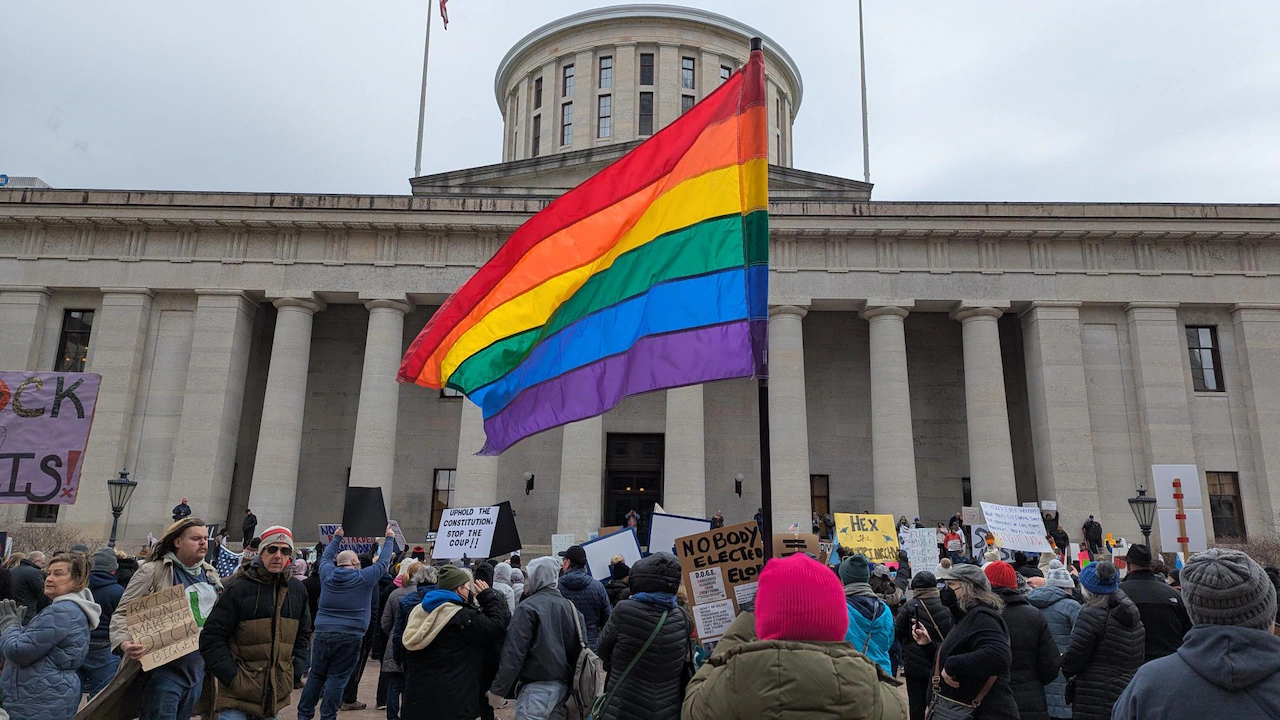
COLUMBUS, Ohio – With Ohio legislators back from summer recess, advocates are bracing as a new slate of anti-LGBTQ bills is pending in the statehouse.
Ohio lawmakers passed several GOP-bills that predominantly targeted transgender youth last legislative session. But as the national political climate becomes increasingly hostile toward LGBTQ people – especially transgender individuals – the fear is that future legislation could target adults.
Language included in the final version of the state’s operating budget signed into law in June displayed a willingness to take anti-LGBTQ policy in that direction. And new bills are already in the hopper that would regulate adults’ behavior.
The question is: How far will it go?
“We’ve seen these attempts in other states and at the federal level,” said Dwayne Steward, executive director of Equality Ohio. “We’ve seen attempts to criminalize parents trying to get their kids the medical care they desperately need. We’ve seen attempts to criminalize doctors for providing that care. We’ve seen attempts to use the surveillance state against LGBTQ folks—to put people on government lists based on who they are or the treatment they’ve sought.”
All of this involves legislative attempts to regulate a tiny part of the population. The Williams Institute at UCLA estimated in 2025 slightly less than 1% of more than 242 million Americans identified as transgender.
The state budget bill included language that escalated Ohio’s transgender position by formally setting as state policy that only two sexes – male and female – are recognized. While the full impact of the policy isn’t known yet, the language has the potential to not only affect not only transgender and gender nonconforming Ohioans, but also intersex people who are born with sex characteristics that don’t fit the typical binary medical definitions of male or female.
The budget also banned the use of Medicaid funds for mental health services that “promote or affirm social gender transition,” and bans government entities from placing menstrual products in men’s restrooms in public buildings. These provisions are set to take effect next week.
Pending are bills include a reintroduction of a ban on drag performances taking place anywhere that isn’t designated as an adult entertainment facility, a proposal to designate “Natural Family Month,” and another requiring political candidates to list their former names on candidacy petitions, not including name changes made due to marriage. The legislation would directly impact transgender individuals who may want to run for public office.
Three transgender candidates seeking office last year in Ohio faced challenges over the names used on their paperwork.
“The people and organizations pushing these anti-LGBTQ attacks have made their intentions very clear: Their ultimate goal is to push LGBTQ people — and specifically trans people — out of public life and back into the closet,” Steward said.
There’s also more legislation regulating the lives of transgender children.
Last legislative session, Ohio lawmakers passed several GOP-bills that predominantly targeted transgender youth, including banning gender-affirming care for minors, restricting transgender women and girls’ participation on sports teams, and restricting transgender individuals’ use of restrooms, locker rooms, changing rooms, and shower rooms in Ohio schools.
“The thing that bothered me about the bills that specifically targeted children is that it targeted parents and parental rights and took away the parental rights of some parents, where Republicans have told us time and time again that they’re the party of supporting parental rights, but it’s selective,” said Ohio Senate Minority Leader Nikki Antonio.
Bills pending this session would build upon last session’s restrictions.
Ohio State House Bill 190 would require parents to give permission before schools use a student’s chosen name or pronouns if they don’t match what’s on the student’s birth certificate.
House Bill 172 would do away with the right Ohio children aged 14 years or older currently have to receive mental health treatment for a limited number of sessions or outpatient services, except for the use of medication, without parental consent. While not specific to LGBTQ youth, advocates warn the legislation could have far-reaching consequences for vulnerable minors.
“That’s really troubling to think about, for all youth who might be experiencing something really harmful at home, to not have that option if this bill were to pass,” said Sean McCann, a policy Strategist for the ACLU of Ohio’s Policy and Advocacy team.
The national push to target transgender youth has had real-life consequences.
According to a national 2024 survey on the mental health of LGBTQ young people from the Trevor Project, which provides crisis intervention and suicide prevention services for LGBTQ young people, 90% of LGBTQ+ youth said their well-being was negatively impacted due to recent politics. Forty-five percent of transgender and nonbinary young people also reported that they or their family have considered moving to a different state because of LGBTQ+-related politics and laws.
“There is a consequence of moving the state in this hateful direction, and I think it’s problematic,” Antonio said. “I have already heard from parents who don’t want to now send their children to college in the state of Ohio, and part of it is because of Senate Bill 1, but part of it is also because they their child doesn’t want to come into a state that either isn’t going to welcome them, or their friends.”
Conversely, Antonio, the first openly gay person to serve in the Ohio General Assembly, has introduced a slate of bills aimed at protecting the LGBTQ community. One would prohibit discrimination based on sexual orientation, gender identity or expression, and another would ban the debunked practiceof conversion therapy statewide. Her proposal to recognize the first full week of June as “Love Makes a Family Week” was unveiled after GOP-legislators introduced plans to designate a month celebrating “natural families” to highlight the role of marriage and childrearing in society.
However, Antonio’s bills face very steep odds in the GOP-dominated legislature. They all lack bipartisan support and have not had any committee hearings.
Antonio said the ripples effects of the national political climate have affected her ability to have conversations with colleagues across the aisle.
“It’s made the conversation to have serious consideration for these kinds of bills that are positive, that are actually upholding people’s rights … It’s made that conversation harder, in a climate where there are people specifically concentrating and focusing on taking away the very right to exist for LGBT folks,” Antonio said.
The legislation in Ohio is part of a broader national trend. Across the country, Republican state lawmakers have introduced a wave of bills targeting the LGBTQ community. While most legislation has not become law, the sheer volume and scope of the bills continue to grow.
The American Civil Liberties Union over 600 anti-LGBTQ state-level bills across the country, including several in Ohio, most of which target transgender people.
While legislators’ work before summer recess was dominated by budget negotiations, the pending bills could be picked up again as lawmakers are returning. Advocates say they’re ready for the fight.



